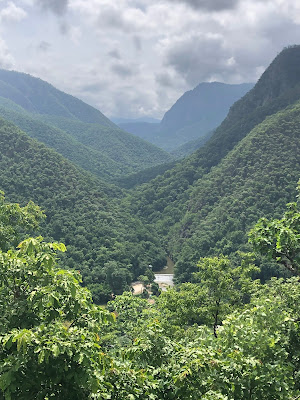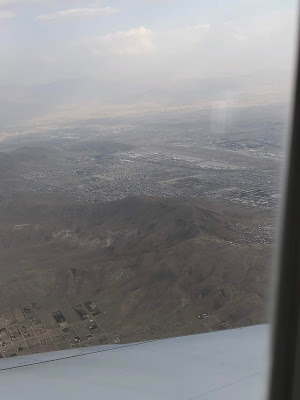
In just a few days I’ll be heading back to Thailand
for part two of the rice growing venture.
I can’t wait to get back to see what the rice is doing (growing
hopefully!) It’s been a busy two months back in the US with clients and work
(including the week in Kabul.) There are still stories and anecdotes I have
wanted to share about the first two months in Thailand (some rice growing
related, most not) so this is my attempt at capturing a little more of the journey
in writing – for myself and for those who are interested.
 |
| Pa Tyng |
Waiting – The first month was more waiting than I
anticipated. I didn’t mind, it gave me time to watch the mountains, something I
didn’t pay much attention to growing up but whenever I return as an adult, I am
quite transfixed by the rugged mountain ranges that cover this part of the
world that I love so much. I’m not sure I ever fully relaxed and exhaled during
my two months in Thailand (which was surprising to me) but the net effect of
time and a very different pace of life did start to rejuvenate and restore me a
little.
 |
| View from Microwave Mountain |
Cultural communication/expectations – Part of the waiting
was definitely entangled up in communication and cultural issues. Though I had
been communicating about my intended plowing goals and everyone knew that was
my intent, it came as a bit of a surprise when the large tractor showed up and
had the fields plowed in a matter of hours. In the long run, this was fine. I
am grateful I didn’t do as much physical labor as I thought I was going to do
because I would have died. The days I did work exhausted me.
Thailand has a word/phrase ‘greng jai’ that doesn’t’
translate that well into English but it’s about not wanting to impose on
someone or cause anyone to lose face so you might do things you don’t want to
do, or give answers that, well, aren’t true, in order to not offend. If I asked
someone if I could go with him somewhere and I understood that we were leaving
at a certain time, and when he didn’t show up at the appointed time, perhaps he
forgot or perhaps he never had any intention me going with him in the first
place…but couldn’t say no to my face. I wonder how much this played out with
the rice plowing as well as a few other times.
There were also some other hilarious moments when things
were said that I was very reluctant to broadcast to everyone within earshot…for
example, once I had an upset stomach. Everyone (and I mean everyone) wanted to
know how many times I had gone to the bathroom. That’s how they tell how sick
you are – sort of makes sense, but again, we (or maybe it’s me) have a lot more
shame around telling people how many times we have had diarrhea! There were other
body issues that were talked about very matter of factly, and I was desperately
wishing I wasn’t present!
There were cultural/language phrases that I could never
bridge. I often told one friend that she literally knew everyone in the
province as there was never anywhere we went that she didn’t know someone. My
point was, she knew a lot of people. She would always reply ‘But I’m from here’
as if that was her excuse. I would think, yes, I know you’re from here, and you
still know so many people…and I don’t have good enough Thai to explain the
nuance!
While I was in Pa Tyng, I stayed in Aunty Yui’s ‘Garden’
house with her son Golf. Sometimes Golf was gone for the night and I would be
there by myself. One night
someone was
rummaging around underneath the house and I was a little concerned (not as concerned
as the one night that I did think someone was breaking in through my bamboo
bedroom wall but it just proved to be a very loud tukgae lizard beating it’s
tail against my wall and thrashing around) so I mentioned it to Aunty Yui and
Golf the next day. I assumed it was their hired hand who helped with the fields
but wasn’t sure. Turns out it was and so they asked him if he comes late at
night in the future to call out and let me know it was him. The next day he
came pedaling up to the house at noon on his bright pink bicycle whistling really loudly to
announce his presence! Some things get lost in translation even among those who
speak the same language!
Many in Thailand (perhaps most) still believe that you get
sick if you get caught in the rain – not that your germy kids have anything to
do with it. Beliefs run deep, which sometimes drove me a little bonkers but I
can’t judge – how many of us grew up believing that we had to wait an hour
after eating before we could go swimming?
And then there were moments that I was grateful for a
culture and tradition different than me. It’s very Thai to ask if you have eaten
yet and what did you eat? I had one friend would often interrupt a conversation
with me by asking if I had eaten yet. She wasn’t thinking of the H.A.L.T acronym
I often use with clients (if you are hungry, angry, lonely, tired take care of yourself…)
but it served the same purpose, interrupting my stress or anxiety of the
moment. I also had two friends who often told me ‘don’t think too much’ as they
viewed that as causing myself undue stress. I often didn’t have to say anything
was troubling me. One evening when I was having a lot of thoughts and stressed
about something, but I thought I was hiding it pretty well, one of my friends
took a glance at me and said ‘don’t think so much…have you eaten yet?’ OK,
point taken. Thank you.
But sometimes the cultural expectations were challenging. I
love rice a lot and am happy to eat it a lot – even three times a day - but
every now and then I wanted a break from it and this caused some challenges as
everyone knows that rice is the ONLY thing that will fill you up in Thailand.
If you haven’t had rice, you haven’t eaten. I could share more stories here but
let’s say sometimes there were duplicitous ways of getting around this belief!
Being rooted - I scribbled this down on a scrap of paper one
day…’I believe in knowing a place as well as you can, staying rooted – even as
I travel, I want a home base but I also want to know where I am when I’m there
– looking for anchors and touch points – thus, that’s why I just enjoy sitting
in their living area and looking at the view and watching the two weaver birds
fly back and forth with long grass building their nests…how the brilliant flame
of the forest flowers are dropping as everything else continues to become more
lush and green.’
Speaking of knowing a place and being rooted, I was
surprised that when I arrived in Maehongson, I wasn’t giddy with excitement at
the opportunity of being there for the longest stretch of time in two decades.
I was certainly happy and grateful to be there but I didn’t have the level of excitement
that I thought I would have - and that I have experienced on previous trips.
Maybe it is because over the last ten years, I’ve been fortunate enough to be
able to visit five or six times. I realized that is how my village neighbors
view me. When I initially arrived I was walking down the village path and
someone passed me on their bike and said ‘Oh Duncan, when did you arrive…have
you eaten yet?’ and then kept going. It just felt very normal for me to be
there and clearly was normal to this person that wasn’t surprised at all to see
me back.
 |
| Maehongson |
The actual field work – As I was plowing with Uncle Yurn,
Tori Kelly’s cover of Seal’s Crazy was in my head… ‘In a world full of people
only some want to fly, isn’t that crazy?’ That may be a good theme for this whole
endeavor. How many people take a break mid career to follow a dream or do
something that doesn’t quite fit the mold we have been taught. Not many.

I was also struck by how the times have changed as society switches from a largely agriculture based economy to a modern cash based one. Twenty years ago farming was still a family affair. Everyone chipped in. When it came to busy times, extended family and friends would show up for the transplanting or harvest. Now the children have moved to cities or if they are still around are working in Maehongson at the Toyota dealership or regular cash paying jobs. That means the work of pulling up the rice seedlings and transplanting the rice is done by hired hands - often immigrants or refugees. I was shocked when I went out to observe the transplanting that I knew none of the women doing the work. This of course mirrors what we have experienced in the West when it comes to farming/agriculture but to see it happen so rapidly is jarring.


























































